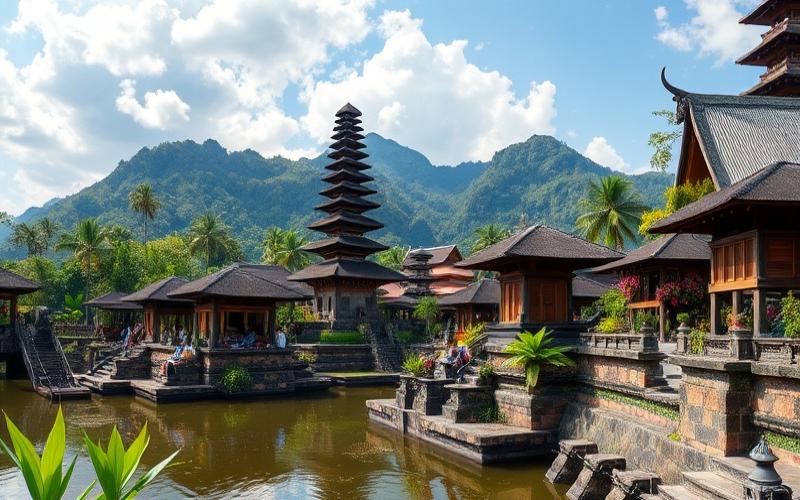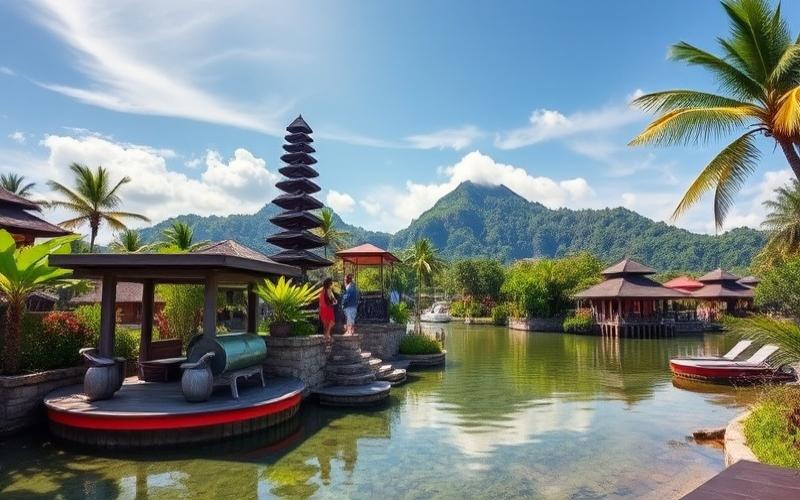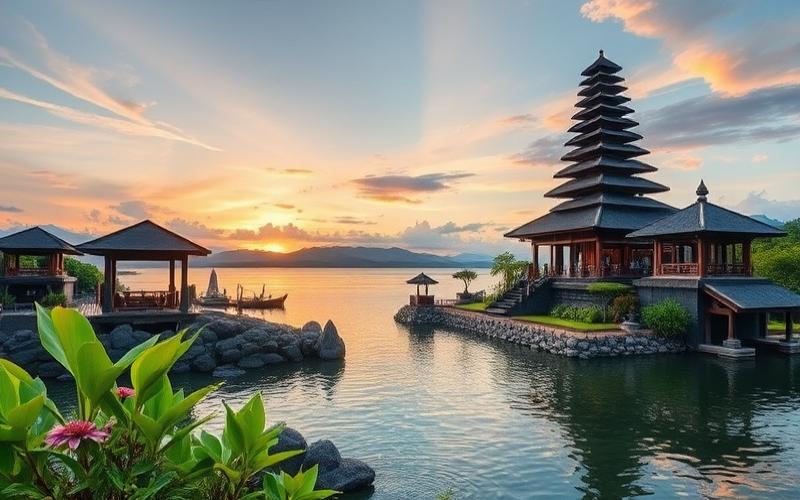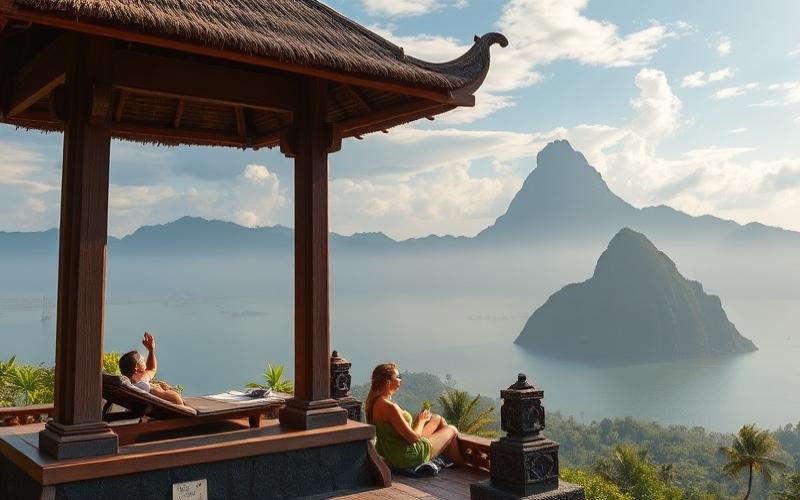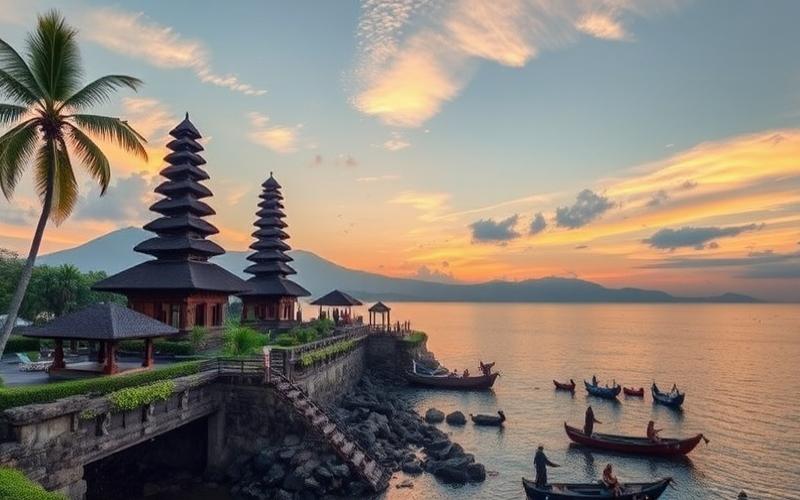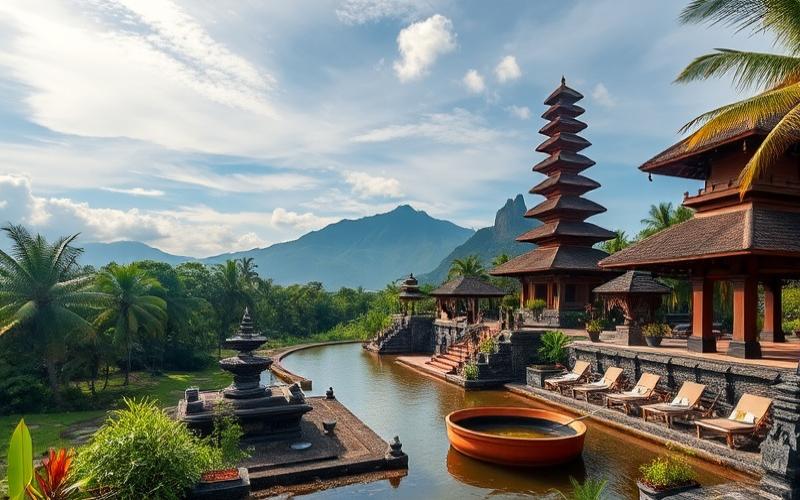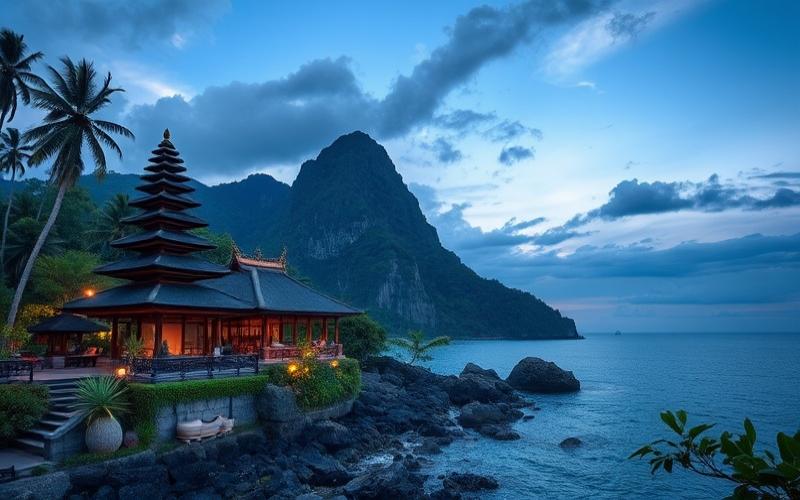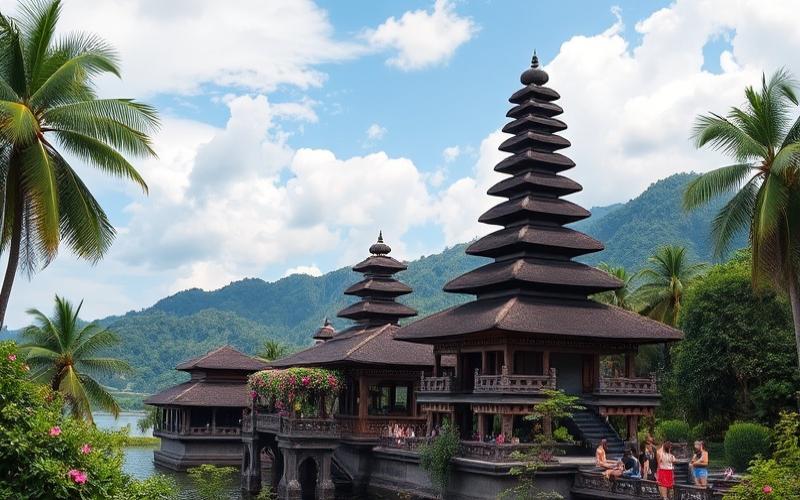
 Published on and written by Cyril Jarnias
Published on and written by Cyril Jarnias
Investing in Bali real estate in Indonesia offers a unique blend of paradise landscapes and attractive economic opportunities, drawing increasing numbers of international investors. However, before diving into this picturesque island’s booming property market, it’s crucial to understand the role of mandatory insurances that protect both buyers and sellers.
This article provides a detailed comparison of these essential insurances, highlighting local specifics and regulatory requirements, to help potential investors navigate this dynamic and intriguing environment with confidence.
Home Insurance in Bali: Essential Selection Criteria
Common Types of Damage in Bali Requiring Home Insurance:
- Earthquakes and volcanic activity: Bali is located in an active seismic zone, exposing homes to frequent risks of earthquakes and volcanic eruptions.
- Floods: Heavy tropical rains can cause sudden flooding, damaging structures and property.
- Fires: Domestic fires pose a significant risk to villas, due to both the climate and sometimes outdated electrical systems.
- Theft and burglary: Security varies by neighborhood; theft is among the claims regularly filed by expatriates and residents.
- Damage caused by others or accidents on the property (civil liability): Any injury or damage occurring on your premises could lead to financial responsibility.
Major Insurance Companies Operating in Indonesia Suitable for Bali:
| Company | Specifics |
|---|---|
| Allianz Indonesia | Comprehensive coverage for expatriates |
| AXA Mandiri | Customizable products |
| Zurich Indonesia | Strong international reputation |
| ACA Asuransi | Local presence with varied offerings |
| Sinarmas | Economical options |
Key Criteria for Choosing Home Insurance in Bali:
- Personal property coverage (furniture, electronic equipment)
- Protection against natural disasters (earthquake, flood)
- Included civil liability
- Deductible level applied (amount you pay out-of-pocket in case of claim)
- Customer service accessibility (availability in English/French)
- Clear procedures for claim reporting/tracking
- Emergency assistance options
How to Effectively Compare Different Policies:
- Create a precise list of risks your property faces based on its location.
- Compare details of main coverages and exclusions:
- Natural disasters included or optional?
- Personal property covered up to what amount?
- High or low deductible?
- Examine value for money relative to insured amount:
- Calculate average annual cost (in Indonesia approximately 0.20% of insured capital).
- Carefully read customer reviews about responsiveness during claims.
- Request personalized quotes from multiple insurers.
Subscription Process in Indonesia and Legal Requirements:
- Select insurer after detailed comparison
- Complete form accurately describing the residence: area, exact location, estimated value of real estate + furnishings
- Provide documentation:
- Title/property deed or rental agreement
- Valid ID/passport
- Indonesian bank statement if automatic payment desired
- Wait for potential inspection by authorized agent
- Electronic/paper signature then initial payment
Note: Home insurance is not legally mandatory unless contractually required by a bank during a mortgage; however, it’s strongly recommended given Bali’s specific natural risks.
Good to Know:
In Bali, home insurance is crucial due to natural risks such as frequent earthquakes and floods; major insurance companies in Indonesia, like Allianz and AXA, offer suitable coverage including personal property protection, civil liability, and various deductible options. It’s essential to compare policies based on customer service and specific needs; excellent advice is to check the company’s reputation and carefully read contract clauses. In Indonesia, home insurance subscription is generally not mandatory but highly recommended; the process involves providing personal identification, proof of ownership, and possibly property inspection. Also ensure to verify local legal requirements to avoid surprises.
Essential Tip:
Always prioritize a policy that explicitly includes protection against earthquakes/floods as some basic offers exclude these major perils in Bali.
Summary Table – Essential Criteria
| Criterion | Why It’s Important |
|---|---|
| Natural Disasters | High risks throughout the island |
| Personal Property | Often significant value for expats |
| Civil Liability | To cover medical/legal expenses |
| Deductible | Direct impact on actual cost |
| Customer Service Quality | Facilitates post-claim procedures |
Methodically comparing each offer thus allows optimal adaptation of coverage to Balinese specifics while optimizing your home insurance budget.
Property Owner Liability: Legal Obligations in Bali
In Bali, property owner liability is an essential aspect of real estate management. Although subscription to liability insurance is not always legally mandatory for individual owners, it’s strongly recommended and may be required in certain rental contracts or by some property management agencies.
Legal Obligations and Local Requirements
In Bali, there’s no law systematically requiring property owners (villa or individual house) to subscribe to liability insurance. However, this coverage often becomes necessary in practice:
- Many rental contracts require it to secure tenants’ stay and protect the owner against financial consequences of potential damages caused to third parties.
- Some real estate agencies recommend or impose such coverage during management mandates.
Insurers in Bali typically offer coverage ranging from 500 million IDR to 2.5 billion IDR depending on property value and desired level.
Types of Covered Damages
Liability insurance protects the owner against financial consequences related to unintentional harm caused to others (third parties), including:
- Bodily injuries suffered by a guest, visitor, or even passerby (example: slip on wet floor in the villa)
- Material damages occurring at neighbors’ properties due to incidents originating from the insured property (example: water leak causing flooding of adjacent land)
- Medical expenses incurred following an accident in the residence
Common Exclusions
Certain situations remain excluded:
- Intentionally caused damages
- Harm related to professional activity conducted at home
- Claims involving motor vehicles
- Damages between close relatives or self-inflicted
Concrete Examples Where Liability Could Apply
| Situation | Possible Liability |
|---|---|
| A guest gets injured falling on poorly maintained step | Yes |
| A leak causes partial collapse of neighbor’s shared wall | Yes |
| Undeclared dog attacks passerby in front of villa | Yes (specific requirement for certain breeds) |
| Damages resulting from roof neglect causing flooding during rainy season | Yes |
Comparison with Other Indonesian Regions
Throughout Indonesia, there’s currently no uniform national requirement regarding home liability insurance. However:
- In some major cities like Jakarta or Surabaya, it’s also observed that this coverage remains optional but strongly advised in any serious contract.
- In Bali more than elsewhere—due to intensive tourism—agencies are more inclined to require these insurances to protect their image and secure their foreign clients.
Integration with Mandatory Property Insurance
In Indonesia and specifically in Bali:
- Home insurance frequently includes multiple components: material damages (fire, natural disasters), theft… The “property owner liability” coverage complements this foundation by covering harm suffered by others following an incident related to the property.
- For certain animals considered dangerous (specific categories), there’s however an explicit requirement—regardless of property status—to subscribe to dedicated insurance.
Structured Summary
Synthetic list:
- No general legal obligation but frequent contractual requirement
- Typical coverage: third-party injuries & damages to external properties caused from your property
- Exclusions: voluntary acts/professional activity/vehicles/internal family damages
- Common practice reinforced by Balinese tourism context
Voluntary but quasi-systematic subscription to liability insurance establishes itself as professional standard for any serious rental property owner wanting to lease their villa with complete legal security.
This thus allows Balinese property owners—both local residents and expatriates—not only to meet growing contractual expectations but especially to ensure their peace of mind against varied risks inherent to the island’s dynamic real estate market.
Good to Know:
In Bali, property owners must subscribe to liability insurance that covers damages caused to third parties, such as injuries suffered by a guest slipping on wet floor in a property or damages caused by a fallen tree on neighboring land. Local legislation specifically requires owners to include this coverage in their property insurance, as it aligns with protection standards against unforeseen events to ensure quick compensation in case of dispute. Although similar to other Indonesian regions, Bali requires particular attention to local conditions, due to dense tourism and specific infrastructure, increasing liability risks. Compared to the rest of the country, where some provinces might be less rigorous, complying with Balinese requirements allows alignment with laws that are part of essential overall real estate regulation.
Rental Risk Coverage: How to Properly Protect Yourself in Bali
Main rental risks in Bali for property owners and tenants include:
- Theft, burglary, and vandalism, particularly in tourist areas or during extended absences.
- Natural disasters such as earthquakes, volcanic eruptions (proximity to Mount Agung), floods, and landslides.
- Domestic fires or those related to sometimes outdated electrical systems.
- Legal risks: disputes over property or lease, non-compliance with leasehold payments potentially leading to loss of property use.
- Civil liability in case of damages caused to third parties (neighbors, visitors) by the tenant or property owner.
Summary Table of Main Risks and Associated Insurances:
| Risk | Available Insurance | Local Specifics |
|---|---|---|
| Theft/burglary/vandalism | Standard home insurance | Often high deductible |
| Natural disasters | Natural disaster guarantee | Often optional; carefully verify extent |
| Fire | Fire insurance | Essential but sometimes limited in basic offers |
| Civil liability | Tenant/owner liability insurance | May be separate depending on insurer |
| Legal disputes | Legal protection | Rarely included; to subscribe separately |
Available Insurances in Bali:
Standard Home Insurance: Typically covers building damages against fire, theft, and certain water damages. Coverage against natural disasters is often an additional option that must be explicitly requested.
Liability Insurance: Can be divided into owner liability (damages caused by property defects) or tenant liability (accidental damages caused to the property). This coverage isn’t systematically included in all local contracts.
Specific Climate/Natural Risk Insurances: Due to geographical location on the “Ring of Fire,” it’s recommended to add coverage for earthquakes and volcanic eruptions. Some international companies also offer tsunami coverage.
Local Legislation & Minimum Required Standards:
In Bali, no law strictly mandates home insurance subscription for private rentals. However:
- For certain commercial leases or seasonal rentals intended for regulated hospitality/tourist rentals, specific guarantees may be required by contract.
- Minimum requirements are therefore contractual rather than legal. It’s thus up to the parties (owner/tenant) to define their insurance obligations during lease drafting.
Practical Tips for Choosing Your Coverage:
- Always prioritize a policy that explicitly mentions coverage for seismic/volcanic/flood risks—even if it implies higher cost.
- Carefully compare deductibles, compensation limits, and exclusions between local Indonesian companies and international insurers specialized in expatriation/foreign real estate investment.
- Systematically request an English-translated copy of the contract if you don’t perfectly master Bahasa Indonesia to avoid surprises related to hidden restrictive clauses.
Specific Recommendations for Foreign Owners:
It’s essential for any foreign investor:
- To verify that their contract properly protects their rights even in case of land disputes involving multiple stakeholders;
- To demand written proof that all previous obligations on the land title have been settled;
- To consult an independent local notary specialized before signing;
- To prioritize if possible a recognized international company with local presence in Bali with accessible English/French-speaking customer service;
- To systematically include in the annual budget all additional costs related to “natural disaster” extensions.
Quick Checklist – To Verify Before Any Subscription:
- Clauses related to major exclusions (earthquake/non-coverage of volcanic activity)
- Prior declaration obligations
- Maximum reimbursement amount
- Compensation timelines
- 24/7 multilingual assistance
By following these practical tips and prior contractual verifications, both property owners and tenants can significantly limit their exposure to frequent hazards encountered in Bali while sustainably securing their local real estate investment.
Good to Know:
In Bali, the most common rental risks include damages caused by earthquakes, floods, and fires, as well as theft and vandalism. To protect themselves, it’s crucial to subscribe to home insurance covering these specific risks, along with liability insurance for tenants and property owners. Local legislation requires minimum coverage standards, although they vary by property type and location. To choose adequate coverage, verify that the insurance includes protection against natural disasters, often frequent in this region. Foreign owners and investors should pay attention to differences between local and international policies, meticulously comparing coverages, exclusions, and limits of each contract. It’s recommended to consult a reputable local broker and gather client reviews before committing to an insurer.
Disclaimer: The information provided on this website is for informational purposes only and does not constitute financial, legal, or professional advice. We encourage you to consult qualified experts before making any investment, real estate, or expatriation decisions. Although we strive to maintain up-to-date and accurate information, we do not guarantee the completeness, accuracy, or timeliness of the proposed content. As investment and expatriation involve risks, we disclaim any liability for potential losses or damages arising from the use of this site. Your use of this site confirms your acceptance of these terms and your understanding of the associated risks.







